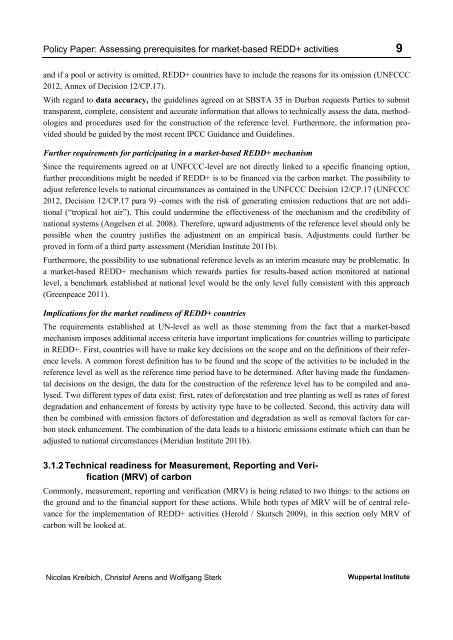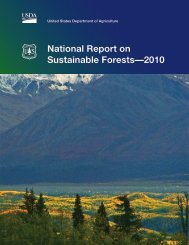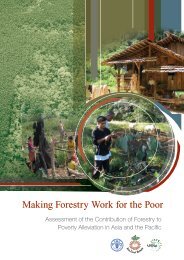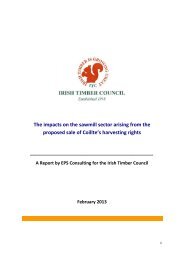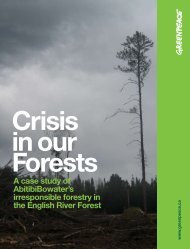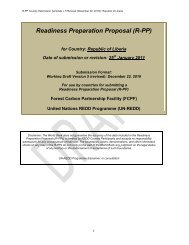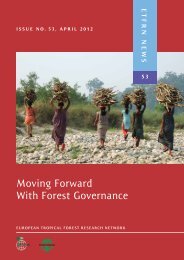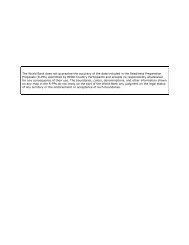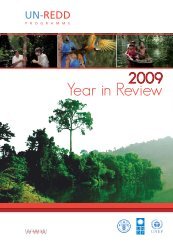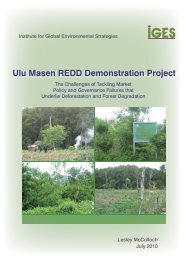pdf 1242 KByte - JIKO
pdf 1242 KByte - JIKO
pdf 1242 KByte - JIKO
You also want an ePaper? Increase the reach of your titles
YUMPU automatically turns print PDFs into web optimized ePapers that Google loves.
Policy Paper: Assessing prerequisites for market-based REDD+ activities 9<br />
and if a pool or activity is omitted, REDD+ countries have to include the reasons for its omission (UNFCCC<br />
2012, Annex of Decision 12/CP.17).<br />
With regard to data accuracy, the guidelines agreed on at SBSTA 35 in Durban requests Parties to submit<br />
transparent, complete, consistent and accurate information that allows to technically assess the data, methodologies<br />
and procedures used for the construction of the reference level. Furthermore, the information provided<br />
should be guided by the most recent IPCC Guidance and Guidelines.<br />
Further requirements for participating in a market-based REDD+ mechanism<br />
Since the requirements agreed on at UNFCCC-level are not directly linked to a specific financing option,<br />
further preconditions might be needed if REDD+ is to be financed via the carbon market. The possibility to<br />
adjust reference levels to national circumstances as contained in the UNFCCC Decision 12/CP.17 (UNFCCC<br />
2012, Decision 12/CP.17 para 9) -comes with the risk of generating emission reductions that are not additional<br />
(“tropical hot air”). This could undermine the effectiveness of the mechanism and the credibility of<br />
national systems (Angelsen et al. 2008). Therefore, upward adjustments of the reference level should only be<br />
possible when the country justifies the adjustment on an empirical basis. Adjustments could further be<br />
proved in form of a third party assessment (Meridian Institute 2011b).<br />
Furthermore, the possibility to use subnational reference levels as an interim measure may be problematic. In<br />
a market-based REDD+ mechanism which rewards parties for results-based action monitored at national<br />
level, a benchmark established at national level would be the only level fully consistent with this approach<br />
(Greenpeace 2011).<br />
Implications for the market readiness of REDD+ countries<br />
The requirements established at UN-level as well as those stemming from the fact that a market-based<br />
mechanism imposes additional access criteria have important implications for countries willing to participate<br />
in REDD+. First, countries will have to make key decisions on the scope and on the definitions of their reference<br />
levels. A common forest definition has to be found and the scope of the activities to be included in the<br />
reference level as well as the reference time period have to be determined. After having made the fundamental<br />
decisions on the design, the data for the construction of the reference level has to be compiled and analysed.<br />
Two different types of data exist: first, rates of deforestation and tree planting as well as rates of forest<br />
degradation and enhancement of forests by activity type have to be collected. Second, this activity data will<br />
then be combined with emission factors of deforestation and degradation as well as removal factors for carbon<br />
stock enhancement. The combination of the data leads to a historic emissions estimate which can than be<br />
adjusted to national circumstances (Meridian Institute 2011b).<br />
3.1.2 Technical readiness for Measurement, Reporting and Verification<br />
(MRV) of carbon<br />
Commonly, measurement, reporting and verification (MRV) is being related to two things: to the actions on<br />
the ground and to the financial support for these actions. While both types of MRV will be of central relevance<br />
for the implementation of REDD+ activities (Herold / Skutsch 2009), in this section only MRV of<br />
carbon will be looked at.<br />
Nicolas Kreibich, Christof Arens and Wolfgang Sterk<br />
Wuppertal Institute


